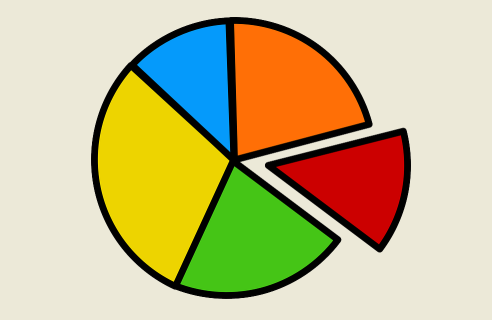By Steve Sosnick, Chief Strategist at Interactive Brokers
What happens when a leading growth stock stops growing? Its stock price falls by 20% or more. We saw it two weeks ago when Netflix (NFLX) reported slowing subscriber growth in its earnings release, and we see it again after Meta Platforms (FB) said something similar.
Growth at a Reasonable Price (GARP) has always been the holy grail for investors. Identifying a company with solid growth in revenues, earnings, and/or cash flows that was trading at a multiple around the market’s average was often a reliable path to a profitable investment. Sometime during the past two years, I believe that GARP morphed into Growth at Any Price (GAAP)[i].
There are several factors that caused that change. For one, the massive market inflows tended to gravitate toward well-known, high-performing stocks. Success breeds success.
Feedback Loop
The rising popularity of passive investing and ETFs then caused a feedback loop. As these companies outperformed, their weight in popular market-capitalization weighted indices like the S&P 500 (SPX) and NASDAQ 100 (NDX) grew.
Indexers and ETFs had no choice but follow along and buy more as money flowed into their funds. Finally, the era of negative real interest rates made a mockery of conventional valuation measures. One can apply near-infinite valuations to future cash flows when discounting them at zero or negative real rates.
As investors crowd into winning stocks, they sometimes become oblivious to the fact that it can be increasingly difficult to exit them en masse. Sure, it’s easy to sell stock into a rising market, making day-to-day trading quite easy, but if something causes investors to rush to the exits, it can get ugly quickly.
I warned of this risk periodically, most recently about a month ago:
“After March of 2020, the tech sector was perceived as a relative bastion of stability… If investors had a change of mindset that changed their fundamental perception of the relatively crowded tech sector, the rush to the exits from a crowded trade could have a profound effect on tech volatility specifically and market volatility over all.”
Stampede Mentality
A rush to the exits can cause a dangerous stampede, both in the real world and in markets. In the investing world, if the stampede occurs in a key holding in a wide range of both indexed and active portfolios, the collateral damage can be severe. That’s why we see major indices under pressure.
For those of you keeping score at home, FB’s decline means that 2 of the 5 FAANG names (FB, NFLX) got clobbered after earnings and 2 have been rewarded handsomely (Apple [AAPL], and Alphabet [GOOG & GOOGL])[ii].
To read this post in its entirety, please click here and visit the Traders’ Insight blog.
Photo Credit: Dako Huang via Flickr Creative Commons
FOOTNOTES
[i] Ironically, GAAP is also the acronym for Generally Accepted Accounting Principles, a form of reporting that is sometimes shunned by fast-growing companies. For example, the most closely followed earnings measure for Tesla (TSLA) is a non-GAAP number.
[ii] Another irony – 2 of the 5 names in FAANG no longer make sense after Facebook became Meta and Google became Alphabet. But the symbols still work for the acronym.
DISCLOSURE: INTERACTIVE BROKERS
The analysis in this material is provided for information only and is not and should not be construed as an offer to sell or the solicitation of an offer to buy any security. To the extent that this material discusses general market activity, industry or sector trends or other broad-based economic or political conditions, it should not be construed as research or investment advice. To the extent that it includes references to specific securities, commodities, currencies, or other instruments, those references do not constitute a recommendation by IBKR to buy, sell or hold such investments. This material does not and is not intended to take into account the particular financial conditions, investment objectives or requirements of individual customers. Before acting on this material, you should consider whether it is suitable for your particular circumstances and, as necessary, seek professional advice.
The views and opinions expressed herein are those of the author and do not necessarily reflect the views of Interactive Brokers LLC, its affiliates, or its employees.
Any trading symbols displayed are for illustrative purposes only and are not intended to portray recommendations.
In accordance with EU regulation: The statements in this document shall not be considered as an objective or independent explanation of the matters. Please note that this document (a) has not been prepared in accordance with legal requirements designed to promote the independence of investment research, and (b) is not subject to any prohibition on dealing ahead of the dissemination or publication of investment research.
The Standard and Poor’s 500, or simply the S&P 500, is a stock market index tracking the performance of 500 large companies listed on stock exchanges in the United States.The Nasdaq Composite is a stock market index that includes almost all stocks listed on the Nasdaq stock exchange. Investors can’t invest directly in indexes.
DISCLOSURE: OPTIONS TRADING
Options involve risk and are not suitable for all investors. For more information read the Characteristics and Risks of Standardized Options, also known as the options disclosure document (ODD). To receive a copy of the ODD call 312-542-6901 or copy and paste this link into your browser:



